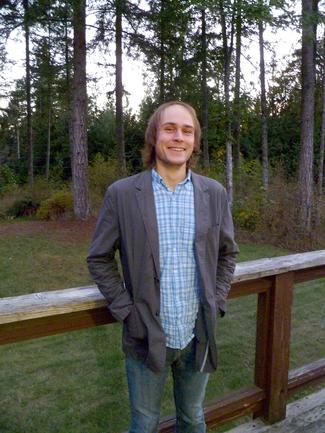Martin Chomeczko, Second Year, Best Essay, 2015-2016

Martin Chomeczko’s English 233 essay, “Possible Futures? Analysing Societal Collapse in the Environmentally Ravaged Worlds of Monica Hughes’s The Crystal Drop and Janet McNaughton’s The Secret Under My Skin” captivated us. Essentially, Martin’s paper makes the conclusion that both of the works “present frighteningly realistic possibilities for the state of our society if we do not begin to more seriously combat the problem of environmental degradation.” While Martin is not currently working on a degree—having previously graduated from VIU in the spring of 2014 with a history degree—he decided to reenroll at VIU as an exploratory student. Taking English 233 in the Spring 2016 semester provided him with a new challenge that took him out of his comfort zone. As he describes, literature has enriched his life in many ways and continues to do so:
Given that I am an avid reader, literature has been absolutely instrumental in every aspect of my life. It has been a very important tool in enriching my studies. In general, I feel that both the study and the definition of the term history are much too rigid. In order to properly progress the study of anything, I believe that boundaries have to be defied and conventions need to be eliminated. I have a particular interest in postmodern literature. Authors like Haruki Murakami and David Mitchell have shown me that the expected ideas of structure, form, and plot can successfully be ignored. As I was completing my studies in history, I was constantly influenced by postmodern ideals and strived to not let myself be limited by the traditional restrictions placed on the study of the subject.
It is precisely this interdisciplinary and inquisitive approach that makes Chomeczko’s award-winning essay so compelling; ultimately, he makes the case that literature has a vital role to play in the fight against environmental degradation. As he contends in his essay, novels like The Crystal Drop and The Secret Under My Skin are exceptionally important case studies as we attempt to avoid complete environmental destruction. Given that environmental ruin is a very real problem in the world today, Martin has useful advice about how literature helps us understand the possible consequences of the escalating environmental crisis we face. Challenging W.H Auden’s provocative pronouncement that “[literature] makes nothing happen,” he states that there are two primary ways that fiction can indeed lead to social change and critical understanding of environmental problems:
First, fiction is a very accessible and appealing medium to present important ideas. Readers are able to become invested in the worlds and characters of novels. This means that the ideas that a novel presents—such as those related to environmental problems—can potentially become very personal and prominent for its reader. The second reason literature will be important in combatting environmental degradation can be found in its ability to provide a platform for speculation. With novels like Crystal and Secret, writers are able to suggest what could possibly await the world if we reach the point of near complete environmental destruction. There are plenty of objective, scientifically-based works that properly outline the issues relating to the state of the environment. However, these works do not always discuss what the potential costs of environmental destruction could be for society. These discussions can effectively occur in works of fiction.
While engaged forms of reading and action are needed to create a more just, equitable, and clean future, the possibilities for Martin’s future remains bright. Martin doesn’t have a set path about his life’s direction, but he knows that he wants to continue his studies in some form, possibly becoming a teacher or a writer, or both. Learning, as Martin exemplifies, is a lifelong pursuit with the journey as the destination. Martin’s three must reads peaks to his complex character and genre-defying love of reading. Check them out below!
Martin’s list of top three must reads:
- Survival in Auschwitz by Primo Levi: Levi’s memoir is an absolutely stunning book. As a heartbreaking account of the horrors faced by the Jews, it is an essential read for those trying to understand the Holocaust. However, the book’s value is so much more than this. It is a work that grapples with the question of what it means to be human. There is no doubt in my mind that it should be read by everyone.
- Cloud Atlas by David Mitchell: Mitchell’s 2004 novel is a postmodern classic. The author’s fusion of several different styles and stories into one coherent whole is simply masterful. Nevertheless, the true value of the novel lies in the important themes and ideas it expresses. Through the novel, Mitchell emphasizes that we are all connected in some way and stresses that the actions we take are never truly insignificant.
- This Changes Everything: Capitalism vs. the Climate by Naomi Klein: The importance of this book is rooted in timing. We are at a crossroads when it comes to the problem of environmental degradation. We have to take actions that avoid environmental collapse. The unfortunate reality is that our economic system makes these actions nearly impossible. Klein boldly and bravely outlines how we need to completely change our economic system in order to secure the future of both ourselves and the natural world.
